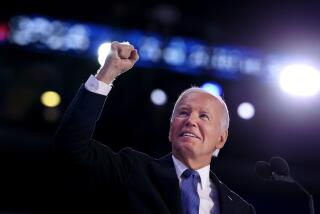Biden Outlines Foreign Policy Stand, Criticizes John Kennedy’s
- Share via
CAMBRIDGE, Mass. — Setting forth his foreign policy views as a Democratic presidential candidate, Delaware Sen. Joseph R. Biden Jr. on Thursday rejected what he called the “unbridled ambition” of President John F. Kennedy’s Cold War leadership.
And, in addressing about 500 students at Harvard University’s John F. Kennedy School of Government, Biden argued vehemently against the interventionism espoused by the Reagan Administration and against the trend toward isolationism fostered by the Vietnam War. Instead, he advocated using what he called pragmatic and moral approaches to international problems on a case by case basis.
But his criticism of Kennedy was particularly striking, not just because he delivered it at the late President’s alma mater, but also because the 44-year-old Biden consistently invokes the Kennedy legend and rhetoric and has appeared to be trying to cast himself in Kennedy’s image as a spokesman for a new political generation.
Biden explained that his own views on the U.S. role in world affairs had been tempered by the lessons of Vietnam and other U.S. experiences abroad since Kennedy took office.
He described the late President, who, he noted, would have been 70 years old today, as “a man of his generation, shaped at an early age by World War II. He understood the generational passage of power and the emerging role of the United States in the world.”
But, in his speech, the fourth in a series on major policy questions delivered to university audiences, Biden asserted: “I take issue with the unbridled ambition of John Kennedy’s foreign policy of the early 1960s, because that policy did not always lead us into making the most prudent commitments.”
He singled out Kennedy’s oft-quoted pledge “to pay any price, bear any burden” to protect the cause of freedom around the world.
“I would amend Kennedy’s words,” Biden said. “While we cannot pay any price and bear any burden, we must pay the right price and bear the right burden.”
To illustrate his point, Biden contended that European security remained “a vital interest” to the United States, but, in Nicaragua, the Reagan Administration has been seeking to increase U.S. involvement without making “a hard-headed assessment of the threat or the opportunity” for the United States.
Cites Three Factors
Before making commitments abroad, Biden said, the United States should weigh three factors: whether its vital interests are at stake, whether the action it contemplates would foster basic American values and whether the proposed actions had a good chance of success.
Biden was harsh in his criticism of the so-called Reagan doctrine, which seeks the overthrow of governments such as Nicaragua that the Administration regards as threats to U.S. security. “The Reagan doctrine assumes that change only comes through force,” he said. “It reduces the struggle between freedom and tyranny to the exchange of fire: AK-47s versus M-16s.”
He contrasted what he called the Reagan Administration’s tendency to “substitute reaction for wisdom” in foreign policy with the “pragmatic leadership” of Soviet leader Mikhail S. Gorbachev. The Soviets, Biden said, “are thinking boldly and strategically for the first time in a long time, and we are reacting without a strategy.”
More to Read
Get the L.A. Times Politics newsletter
Deeply reported insights into legislation, politics and policy from Sacramento, Washington and beyond. In your inbox twice per week.
You may occasionally receive promotional content from the Los Angeles Times.










